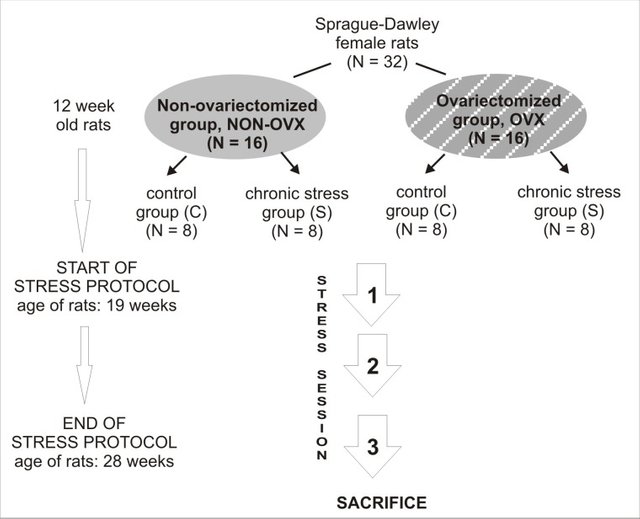Our study - chronic stress lead toward leptin and insulin resistance in the brain
Why we did this study?
To evaluate the changes in the expression level of gonadal steroid, insulin, and leptin receptors in the brain of adult Sprague-Dawley female rats due to ovariectomy and/or chronic stress.
Protocol from our lab

Sixteen-week-old ovariectomized and non- ovariectomized female Sprague-Dawley rats were divided in two groups and exposed to three 10-day- sessions of sham or chronic stress. After the last stress- session the brains were collected and free- floating immunohistochemical staining was performed using androgen (AR), progesterone (PR), estrogen-β (ER-β), insulin (IR-α), and leptin receptor (ObR) antibodies. The level of receptors expression was analyzed in hypothalamic (HTH), cortical (CTX), dopaminergic (VTA/SNC), and hippocampal regions (HIPP).
Results
Ovariectomy downregulated AR in the hypothalamic satiety centers and hippocampus. It prevented or attenuated the stress-specific upregulation of AR in these regions. The main difference in stress response between non- ovariectomized and ovariectomized females was in PR level. Ovariectomized ones had increased PR level in the HTH, VTA, and HIPP. Combination of stressors pushed the hypothalamic satiety centers toward the rise of ObR and susceptibility to leptin resistance. When exposed to combined stressors, the HIPP, SNC and piriform cortex upregulated the expression of IR-α and the possibility to develop insulin resistance.
What we concluded
Ovariectomy exacerbates the effect of chronic stress by preventing gonadal receptor- specific stress response reflected in the upregulation of AR in the satiety and hippocampal regions, while stress after ovariectomy usually raises PR. The final outcome of inadequate stress response is reflected in the upregulation of ObR in the satiety centers and IR-α in the regions susceptible to early neurodegeneration. We discussed the possibility of stress induced metabolic changes under conditions of hormone deprivation.
If you like to read all paper it is published in Croatian Medical Jurnal :)
Great read! You are very concise and I found it very easy to follow your logic. Keep it up, I really enjoyed this!
Thank you! It is really encouraging to hear that! :)
All the ObR and PR confused me a little...
Let me see if i understood currectly, you guys did a ovariectomy to a rat, after the ovh there was an exacerbates in the stress response because of the lack of hormones, after the ovariectomy the rat showed upregulation of insulin and leptin?
Something like this?
Well...I will try to make clear answer :)
Ovariectomy by itself caused the decrease in PR expression in satiety brain regions, contrary to feeding for reward regions in which there is an increased expression. Stress by itself does not affect those regions in the brain. When combined with ovariectomy, stress response nullified ovariectomy and brought levels of steroid hormone receptors to those common for that age or even higher.
Ovariectomy and chronic stress downregulated the levels of ObR in satiety brain regions. Combination
of ovariectomy and stress reversed individual effects and led toward significant upregulation of ObR in hypothalamic satiety centers.
And please be aware that in this study we analyzed insulin and leptin receptors, not insulin and leptin.
Hope you are littl bit less confused now :)
Thanks for the answer, now i get it!!
Where do you think this finding can be applicable?
Looking in the way of applicability lots of additional studies are needed. We already did some of them, but their is lot more to do to make whole puzzle.
In this moment it could be used for better understanding of insulin and leptin resistance mechanism, which is still unclear. Long term goal could be antidiabetic therapy.
Hmmm makes sense, people think the main cause of diabetes is eating sugar... the main cause of diabetes is insulin resistance, which is a result of fat cells being full, the only reason fat cells are full is because of the overconsume of calories, yes sugar can be one of them, but so can protein or fat, or anything that puts you above your calorie maintenance !
Thanks for the answer, i'm waiting for your next post :)